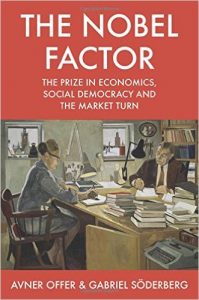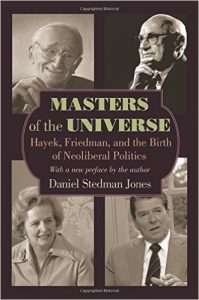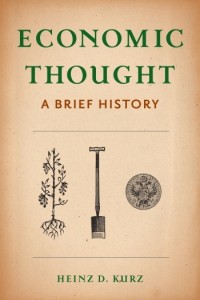Harvey Cox’s [amazon_link id=”0674659686″ target=”_blank” ]The Market As God[/amazon_link], published in a couple of weeks, drove me nuts. I alternated between scribbling ‘X’s and ‘?!’s in the margin, and skipping over long chunks about Christian theology, in which I have zero interest. The book is built out from the notion of orthodoxy and heterodoxy in economics. Of course, ‘orthodox’ economists would use an adjective like ‘mainstream’ to describe themselves, which I guess (self-described) heterodox economists would say is the point. These debates always seem to me more relevant (or rather less irrelevant) to macro than to the empirical applied micro-economics so many of us do; I never know which label to wear myself.
[amazon_image id=”0674659686″ link=”true” target=”_blank” size=”medium” ]The Market as God[/amazon_image]
Anyway, back to the book. The conclusion sums up the message: “First, the Godlike role The Market now exercises is misplaced, and the web of values, narratives and institutions it anchors needs to be critically re-examined. Second, precisely because The Market, despite its disavowals, does operate as a surrogate religion, the kind of rethinking that is needed has been deflected and discouraged.”
Many people will agree with this. I’d guess the ever-thoughtful Branko Milanovic would – he and I had a brief debate here, here and here on ‘commodification’ (ie the status of the market) recently. There are some truly interesting ethical questions in this territory.
Not in this book, however. One of my problems with Cox’s account is the assumption that there is substantial overlap between people who worship The Market and economists, because isn’t that what economics is all about? Given that I teach a whole course exploring the subtleties of the relationship between state and market in public policy, this is personally irritating. It’s also factually incorrect: many economists work on how government/collective intervention can fruitfully bring about higher economic welfare, including by influencing markets. Sure, economists are perhaps more likely than Ms Average to believe markets operate in beneficial ways (or than Mr Average when he is a businessman running a large, dominant company), but that’s far from religious faith in markets.
Market-worship was always more of a political than an economic project, although certainly there was a tide in economics of free-market rational expectations modelling – a tide at its height in the mid to late 1980s. Even the politics seems to be changing. This book comes just as here in the UK we’ve seen the new Conservative Prime Minister pronouncing the need for an industrial policy, while the system shock of the Brexit vote/Trump propularity has alerted the political classes in both the UK and US to the fact that we’re not in libertarian free market-land any more.
There were also minor irritations in the book. For instance, it paints Adam Smith as the ‘saint’ of modern economics, “the patron of the unfettered free market.” This overlooks a raft of recent work highlighting the importance of [amazon_link id=”0143105922″ target=”_blank” ]The Theory of Moral Sentiments[/amazon_link] to any interpretation of Smith – from Emma Rothschild’s [amazon_link id=”B00BNRMO08″ target=”_blank” ]Economic Sentiments[/amazon_link], Nicholas Phillipson’s biography [amazon_link id=”B003VTZRR8″ target=”_blank” ]Adam Smith: An Enlightened Life[/amazon_link], through [amazon_link id=”B01K3PL3FC” target=”_blank” ]Roger Backhouse’s history of economics[/amazon_link] to Russ Roberts’ [amazon_link id=”0241003202″ target=”_blank” ][amazon_link id=”1469029758″ target=”_blank” ]How Adam Smith Can Change Your Life[/amazon_link][/amazon_link].
Anyway, it will be clear that The Market As God falls foul of my regular gripe that it would be great if critics of economics from outside the discipline had more of an idea of what economists actually do. It would have been far more interesting if Cox had addressed, say [amazon_link id=”0007520778″ target=”_blank” ]Al Roth[/amazon_link]’s question about repugnant markets, kidney exchanges etc. Or maybe the questions raised by behavioural economics about when humans are more or less rational than pigeons or capucin monkeys. Still, if you enjoyed Michael Sandel’s What Money Can’t Buy: The Moral Limits of Markets[amazon_link id=”B00BW8NBMS” target=”_blank” ]What Money Can’t Buy: The Moral Limits of Markets by Sandel, Michael on 26/04/2012 unknown edition[/amazon_link] (which also irritated me hugely), you might well like this book too.



